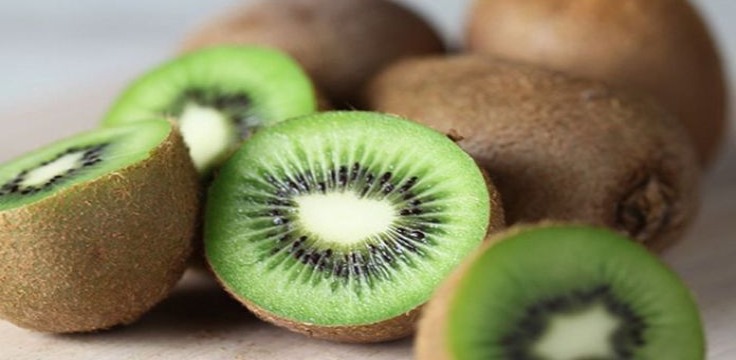Research confirms that kiwifruit may provide a variety of health benefits with its impressive nutrient profile, especially when consumed regularly.
One of the potential benefits of kiwifruit (as is evident from the title of the article) is constipation relief.
Studies carried out in different countries, such as the USA, Japan and New Zealand confirm that kiwifruit might be a natural treatment option for constipation.
It sounds plausible when considering the fact that kiwifruit contains high amounts of dietary fibre.
However, according to researchers, there might also be other mechanisms by which kiwi fruit can contribute to bowel movements.
In this article, we’ll talk about the effects of kiwifruit on bowel movements.
Kiwifruit Against Constipation
Constipation is a quite common gastrointestinal complaint, affecting numerous people around the world [1, 2, 3].
In the U.S alone; around 2.5 million people visit hospitals every year due to constipation, according to reports [4, 5].
Insufficient fluid intake, a sedentary lifestyle, stress, certain medications and many other things can lead to this common digestive problem [1, 6].
However, in most cases, people get constipated due to inadequate fibre intake. As such, high-fibre foods are usually used as a first-line treatment option for constipation.
As mentioned above, kiwifruit (especially the Hayward kiwifruit) is high in dietary fibre, therefore, it should help promote bowel movements [7, 8, 9].
In addition to its fibre content, kiwifruit also contains an enzyme known as actinidin.
Researchers who examined the effects of kiwi on bowel movements suggest that actinidin might be one of the reasons why kiwi consumption usually yields positive results in terms of relieving and preventing constipation [10, 11].
Dr Scott Gabbard — a gastroenterologist at Cleveland Clinic — says; I recommend kiwifruit to my patients who want to tackle chronic constipation in natural ways.
In fact, many doctors report that a great number of patients with chronic constipation seek natural remedies for their symptoms.
Natural Approach to Prevent Constipation
Both prescribed and over-the-counter medicines can provide constipation relief. However, they usually aren’t ideal for long-term use and have potential side effects [12, 13, 14, 15].
“Patients are increasingly seeking evidence-based natural treatments for many medical conditions, including (chronic constipation). They believe that natural products are safer and less costly than prescription medications,” noted researcher Samuel W. Chey, from the University of Michigan [11].
Prunes and psyllium have long been used as evidence-based natural remedies for constipation [16, 17, 18].
In a recent study, the effectiveness of kiwifruit on constipation compared to that of prunes and psyllium.
All three reduced constipation symptoms in the participants who had chronic constipation.
Kiwifruit was slightly less effective in improving the symptoms compared to prunes and psyllium.
However, the participants who were assigned to kiwifruit experienced the highest satisfaction score and least side effects compared to those who were given psyllium and prune.
Prunes are effective for relieving constipation but contain sorbitol which is a FODMAP. Therefore, prunes may not be tolerated well by IBS patients [19, 20].
Psyllium, on the other hand, may cause some side effects. In the study, 33% of participants receiving psyllium complained of abdominal pain, while 19% complained of gas.
Kiwifruit is low in FODMAP, plus, it yielded virtually no side effects on the participants who have chronic constipation.
This was the first study on US patients assessing the effectiveness and tolerability of kiwifruit on chronic constipation.
Studies on Kiwifruit and Constipation,
To date, the effectiveness of kiwifruit on bowel movement has been examined in several studies carried out in different countries.
Here are some of these studies…
In 2002, researchers at the University of Auckland (New Zealand) performed a study involving elderly patients prone to constipation to find out whether kiwifruit has laxative effects. This was probably the first study addressing the effects of kiwifruit on bowel movements. The results showed that eating 1 kiwi daily for 3 weeks led to a bulkier and softer stool, and increased stool production in the participants.
In two different clinical trials — one of them carried out in China in 2007 and the other in Japan in 2009 — researchers found that kiwi consumption helped bowel movements in constipated elderly patients.
In 2010, a team of Chinese researchers aimed to examine the effects of 4-week kiwifruit consumption on bowel activity in patients with IBS/C, meaning IBS with constipation. The results revealed that colon transit time decreased significantly in the IBS/C group that consumed kiwifruit.
In a 2013 study, researchers from New Zealand aimed to test the effectiveness of kiwi fruit extract on people with occasional constipation. It was found that kiwifruit extract containing actinidin enhanced bowel movement frequency and reduced abdominal pain.
In a more recent study (2019); researchers tested whether eating three gold-fleshed kiwifruits relieves constipation and reduces gastrointestinal discomfort in people with mild constipation. The findings suggest that daily consumption of kiwifruit might increase spontaneous bowel movements while reducing gastrointestinal discomfort.
Note: Some of the above-mentioned studies were supported by major kiwifruit manufacturers and exporters.
How Many Kiwis Against Constipation?
The ideal number of kiwifruit that should be eaten daily to relieve constipation is unknown and unspecified.
However, in the studies we examined above, the participants commonly consumed 2 to 3 kiwis a day and experienced constipation relief to some extent.
Based on the studies; eating 2 to 3 kiwifruit a day may help relieve or prevent constipation.
Additional Information
Kiwi’s potential benefits for constipation are mostly attributed to its actinidin and fibre content.
Many factors such as climate, soil, and variety can influence the nutritional profile of kiwis. It is reported that actinidin and fibre are higher in the green variety of kiwifruit than in the gold kiwifruit [21, 22].
If this is the case, green kiwifruit might be slightly more effective than gold-fleshed kiwifruit in terms of relieving constipation.
Please note that although the actinidin enzyme in kiwifruit aids the digestion process, this enzyme may also cause some allergic reactions in some people [23, 24, 25].
In addition to kiwifruit; dates, dried apricots, dragon fruit, flaxseeds, apples and prunes can help you “go”.
Conclusion
The results of scientific studies that have examined the effectiveness of kiwifruit on constipation are quite promising. Plus, in most studies, kiwi consumption didn’t cause a significant side effect in the participants.
Nevertheless; there is no such thing as “Eating kiwis is an exact solution for constipation”. Because constipation can occur due to various reasons including cancer.
It is also important to underline that everyone has a unique bowel function; therefore can respond differently to foods.
We need to see more robust scientific studies to understand how many kiwifruits are ideal and in what way kiwifruit can provide constipation relief.
If you have chronic constipation, work closely with your doctor or dietitian to manage the condition effectively.
Please also ask your doctor/dietitian whether adding kiwifruit to your diet can bring any constipation benefits.




